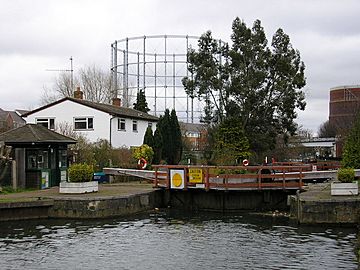Blake's Lock facts for kids
 |
|
| Waterway | River Kennet |
|---|---|
| County | Berkshire |
| Maintained by | Environment Agency |
| Operation | Manual |
| First built | 1802 |
| Length | 37.39 m (122 ft 8 in) |
| Width | 5.75 m (18 ft 10 in) |
| Fall | 1.07 m (3 ft 6 in) |
| Above sea level | about 54 m (177 ft) |
| Distance to Teddington Lock |
55 miles (89 km) |
| Distance to Bristol Harbour |
87 miles (140 km) |
Blake's Lock is a special kind of gate system for boats, called a lock. It is found on the River Kennet in a town called Reading, in England. This part of the River Kennet is managed like it is part of the bigger River Thames. The Environment Agency looks after it.
Contents
History of Blake's Lock
How Old Is Blake's Lock?
Boats have been able to travel on the first mile of the Kennet River since the 1200s. Blake's Lock was first a very old type of lock called a "flash lock." It was known as Brokenburglok.
Early Days and Tolls
Back in 1404, the head of Reading Abbey allowed boats to pass through. They had to pay a small fee, just one penny. This allowed boats to travel between sunrise and sunset.
Improving the Lock for Boats
By 1794, not much had changed. An engineer named John Rennie said it was "a very bad and difficult lock." To make it easier for boats to travel from the Thames all the way to Bristol, the lock was changed in 1802. It became a "pound lock," which is a more modern type of lock.
Modern Features and Upgrades
Blake's Lock still uses manual beams to open and close its gates. These are not the original beams, but new ones were put in place in 2006. This means people still operate the lock by hand, instead of using machines. The lock was closed in winter 2017-2018 for important repairs. Workers fixed the lock gates and the walls of the lock chamber.
Riverside Museum at Blake's Lock
Next to Blake's Lock, you can find the Riverside Museum. This museum tells the story of Reading's two rivers: the Kennet and the Thames. The museum is inside two old factory buildings.
What Can You See at the Museum?
The museum has many interesting things to see. You can find a gypsy caravan and learn about the Romani people. There is also an old medieval mill wheel. You can see preserved turbine machinery. The museum also shows different art exhibits throughout the year.
 | Delilah Pierce |
 | Gordon Parks |
 | Augusta Savage |
 | Charles Ethan Porter |

